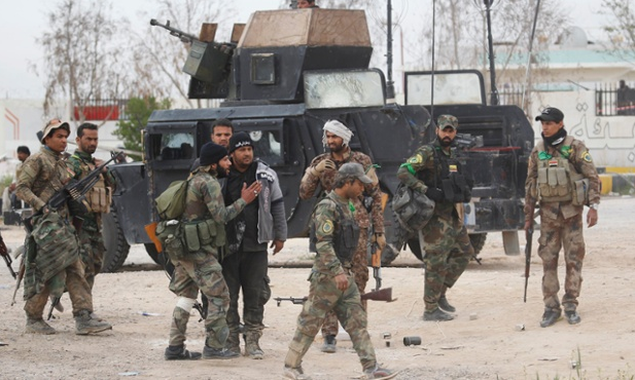The response came as a prominent Sunni preacher urged authorities to prevent Shia militias from carrying out revenge attacks and an Isis spokesman delivered a defiant address that downplayed recent defeats.
A spokesman for the Iraqi prime minister, Haider al-Abadi, said on Friday that the Iraqi army and the Hashd al-Shaabi, the term given to the panoply of militias at the forefront of the campaign against Isis, had received “very clear orders” to “respect the human rights of those communities in those areas.”
“So far as this ongoing operation is concerned, he has not received any complaints about that,” Rafid Jaboori said.
Jaboori said he was aware of the ABC report and said the Iraqi authorities were investigating the incidents shown in the documents, but added that they were unconnected to the Tikrit campaign.
“As recently as two days ago the prime minister renewed his orders and assurances to the local communities in those areas that the first priority is the people and the local communities of those areas,” he said. “The target of this operation is to liberate them from Daesh [Isis].”
Jaboori said local Sunnis had joined the volunteers and were fighting alongside the security forces, and “will be playing a major role in finishing off Daesh in the majority Sunni areas.”
PM’s spokesman tries to allay Sunni fears as forces push to retake Tikrit from Isis, saying no evidence of such crimes in current operation.
He said the Iraqi government was already investigating previous allegations of abuse, in particular alleged atrocities against Sunni civilians in Diyala province that were identified by human rights groups, and “all of the major incidents or controversies about incidents that happened there”.
He said the government was also still investigating the Camp Speicher massacre in June 2104, when up to 1,700 Shia army cadets were massacred by Isis, and which some claim was carried out in collaboration with local Sunnis. Militias taking part in the Tikrit campaign have described it as retribution for the Camp Speicher massacre.
On Friday a prominent Iraqi Sunni preacher urged authorities to prevent Shia militias from carrying out revenge attacks. Sheikh Abdel Sattar Abdul Jabbar said that if the government failed to stop revenge attacks by Shia militias, the country would face reignited sectarian tensions such as the ones it witnessed at the height of the war in 2006 and 2007.
“We ask that actions follow words to punish those who are attacking houses in Tikrit,” Abdul Jabbar said during his Friday sermon in Baghdad. “We are sorry about those acting in revenge that might ignite tribal anger and add to our sectarian problems.
Analysts say the campaign to liberate Sunni areas must be led by members of the community, fearing retributions and revenge attacks that could upend the campaign to drive out Isis.
Joboori said there would be a zero tolerance policy towards any violations, especially against any civilians in those areas.
“We are concerned about the safety of our people no matter their religious background,” he added.
The statements came as Isis appeared to be on the verge of its first major defeat inIraq since last summer’s campaign, with Tikrit all but recaptured by the militias and their Sunni and army allies. The pro-government forces are advancing carefully towards the city centre, avoiding tens of thousands of booby traps and IEDs that were laid down by Isis, officials say.
Isis spokesman Abu Mohammed al-Adnani downplayed the group’s retreat in a defiant 27-minute recording released on Thursday night.
“We are certain that God Almighty is with us,” Adnani said in the recording. “No, O enemies of God, the caliphate will remain until the day of judgment.” He issued a call for global jihad, calling on all Sunnis to join in the fight.
Iran is backing the campaign to retake Tikrit, and has dispatched Qassem Suleimani, the leader of the Quds Force of the Revolutionary Guards to oversee the effort.
Read More


 RSS Feed
RSS Feed